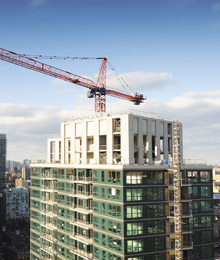Toronto Condo Law – The Condo Uprise
June 14, 2012 by Michael Hill
Filed under Special Features
 The condominium scene has exploded: There are roughly 525,000 units housing over one million residents in Ontario, and that number is on the rise. The concrete jungle grows thick with these popular homes, reshaping the city skyline and how urbanites experience the metropolitan milieu. This chain reaction has also sparked here in Vaughan, where new developments are breaking ground across the city.
The condominium scene has exploded: There are roughly 525,000 units housing over one million residents in Ontario, and that number is on the rise. The concrete jungle grows thick with these popular homes, reshaping the city skyline and how urbanites experience the metropolitan milieu. This chain reaction has also sparked here in Vaughan, where new developments are breaking ground across the city.
But while projects rush upwards, and eager townies flock, complications emerge. “Right now, there are few consumer protections in place for condominiums, especially when it comes to preconstruction,” says Todd Hofley, a condo owner and president of the Liberty Village Residents’ Association. He explains how many residents are forced to move into buildings with unfinished corridors, accept substituted features of equivalent value and wait years for promised amenities to be finalized.
While Hofley acknowledges that many honest, fair and great condo developers operate in the GTA, the condo boom has attracted both good and bad players to the development game, cultivating a range of standards throughout the industry.
Hofley points to contracts rife with obtuse legalese as the culprit, burying caveat clauses that grant developers freedom to alter projects without notifying owners. These legal documents, often-dense labyrinths built on page after page of complex jargon, leave naïve buyers vulnerable to opportunistic developers. “You can walk into a sales centre and they can show you the glossy marketing, but what they don’t say is it doesn’t have to necessarily look like that at all, and there’s very little recourse because it doesn’t fall under the Consumer Protection Act,” he says. It’s an unnerving prospect; particularly when considering that the price of many downtown dwellings easily crack seven figures.
Trinity-Spadina MPP and NDP party member Rosario Marchese says complaints from his riding are a regular occurrence. “There are many problems related to the construction of condo buildings,” he says, noting frustrations over smaller-than-indicated balconies, rattling pipes, faulty air conditioning and conked-out elevators after only one year of operation are just the tip of the iceberg.
Bill 72, the private members bill Marchese is championing, aims to rectify these and other issues afflicting owners by amending the current and outdated Condominium Act. These reforms include instating a review board, which behaves like a tribunal, so owners can quickly and inexpensively resolve disputes with developers; restructuring Tarion, the private corporation responsible for regulating builders and overseeing the Ontario New Home Warranties Plan Act for greater consumer advocacy; licensing and regulating property managers; and implementing a “duty of fair dealing”. This means contracts must be written in a “good face language”, so what developers market is what buyers get when they move in. He’s researched and pushed this reform for the past five years, but because of a Liberal majority, the bill hasn’t made it past a legislative committee, he says. This year marks his fourth attempt.
Both Hofley and Marchese explain that the only recourse for frustrated owners is the court system. The problem, says Marchese, is litigation is highly expensive, deterring consumers and leaving problems unresolved. And developers know and take advantage of this.
“I think we desperately need a reform in many ways,” says Sandra Rinomato, host of HGTV’s Buy Herself. She explains the lifestyle, affordability and security condos offer are ideal for city living, especially for women. While granting developers some flexibility to alter plans is essential to finalize projects, she feels that freedom should be put on a leash. “We need more control,” she says.
Still, while contract language can often be one-sided, consumers need to take some onus. “I think it’s really easy to walk in and buy and say I’ll deal with it later,” she says. “I don’t think they understand the ramifications of the rules and regulations that go with the condo.” For buyers, she suggests getting everything in writing, taking the time to read contracts and turn to an expert, like a condo lawyer, if anything is unclear.
Steve Christodoulou, vice president of the Association of Condominium Managers of Ontario (ACMO), also agrees amendments are needed, but feels Marchese’s approach is too narrow. “We want it to be a broad-base opening when rewriting the act,” he says. In 2011, ACMO and the Canadian Condominium Institute (CCI) put forth a legislative brief providing in-depth recommendations for the condo act. The 100-plus-page report hits a range of topics, including description requirements, telecommunications agreements and false, misleading statements, among others. “Although we support the efforts, we don’t necessarily support that particular bill,” says Christodoulou.
Gerry Miller, managing partner at Gardiner Miller Arnold Barristers & Solicitors, a condo specialty law firm that represents condo buyers and sellers, feels all the political posturing is simply deterring the process. “There absolutely needs to be some sort of reform,” he says, “but you need to have contributions from all the various stakeholders and find a way for the government to balance it.” Any reform needs input from
all parties involved – developers, property managers, condo lawyers and, of course, consumers.
Miller says Marchese’s bill simply doesn’t dig deep enough. Consumer protection certainly needs reinforcing, but he feels most of Marchese’s points are superficial, and won’t generate real impact. One of Miller’s biggest concerns is that developers are single-purpose corporations with no assets. This issue could be rectified if every developer was financially accountable for a project right to the end of the process. “So it doesn’t matter if a company goes bankrupt, there is some security and some way the consumer will be protected all the way to the very end,” says Miller.
While no time line can be confirmed because of the uncertainty of the political process, and despite the discrepancies from various parties, Marchese remains optimistic that reform is on the horizon. More and more condo owners are coming forward, demanding government intervention. And when the public makes demands, the government starts listening. “And the time has come, I think,” says Marchese.










Comments
Feel free to leave a comment...
and oh, if you want a pic to show with your comment, go get a gravatar!